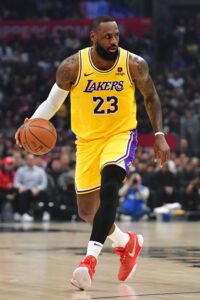No-trade clauses are rare in the NBA, since a player must meet a specific set of criteria in order to qualify for one. And even those players who become eligible may not have the leverage to demand a no-trade clause, which significantly limits a team’s flexibility in future trade negotiations.
To be eligible to negotiate a no-trade clause, a player must have at least eight years of NBA experience and has to have spent at least four years (not necessarily the most recent four years) with his current team. He also must be signing a free agent contract, rather than an extension.
 [RELATED: Hoops Rumors Glossary: No-Trade Clause]
[RELATED: Hoops Rumors Glossary: No-Trade Clause]
For the first time in seven seasons, multiple players will have no-trade clauses in their contracts during the 2024/25 league year. In addition to Bradley Beal, who got his no-trade clause when he signed his current contract in 2022, LeBron James negotiated a no-trade clause into his new deal with the Lakers.
The last time more than one player had an actual no-trade clause in his contract was in ’17/18, when three players – James (as a Cavalier), Dirk Nowitzki, and Carmelo Anthony – had them.
Although Beal and James are the only players who have explicit no-trade clauses in their current deals, there are several others who will have implicit no-trade clauses in 2024/25, giving them the ability to veto trades during the current league year.
A player who re-signs with his previous team on a one-year contract – or a two-year deal with an option year – is given no-trade protection, unless he agrees to give up that protection when he inks his deal. That group doesn’t include players on two-way contracts, but it does include players who accept standard (non two-way) one-year qualifying offers.
A player who signs an offer sheet and has that offer matched by his previous team also has the ability to veto a trade for a full calendar year.
With those criteria in mind, here are the players who must give their consent if their teams want to trade them during the ’24/25 league year:
Players with a no-trade clause:
- Bradley Beal (Suns)
- LeBron James (Lakers)
Players whose offer sheets were matched:
- None
Players re-signing for one year (or two years, with a second-year player/team option):
Note: Players marked with an asterisk (*) are on non-guaranteed contracts.
- Bol Bol (Suns)
- Vlatko Cancar (Nuggets)
- Seth Curry (Hornets)
- Luka Garza (Timberwolves)
- James Harden (Clippers)
- James Johnson (Pacers) *
- DeAndre Jordan (Nuggets)
- Luke Kennard (Grizzlies)
- Luke Kornet (Celtics)
- Damion Lee (Suns)
- Kyle Lowry (Sixers)
- Trendon Watford (Nets)
If any player who re-signed for one year approves a trade during the 2024/25 league year, he’ll have Non-Bird rights at season’s end instead of Early Bird or full Bird rights.
Any player who approves a trade will retain his veto ability on his new team, and would have to consent to any subsequent deal during the 2024/25 season.
The following players were re-signed to one-year contracts (or two-year deals with an option year), but have agreed to forfeit their right to veto a trade in 2024/25:
- Precious Achiuwa (Knicks)
- Charles Bassey (Spurs)
- Thomas Bryant (Heat)
- Gary Harris (Magic)
- Aaron Holiday (Rockets)
- Keon Johnson (Nets) *
- Alex Len (Kings)
- Sandro Mamukelashvili (Spurs)
- Markieff Morris (Mavericks) *
- Kelly Oubre (Sixers)
- Garrett Temple (Raptors)
- Tristan Thompson (Cavaliers) *
- Moritz Wagner (Magic)
Giving up the right to veto a trade was introduced as an option in the 2023 Collective Bargaining Agreement.